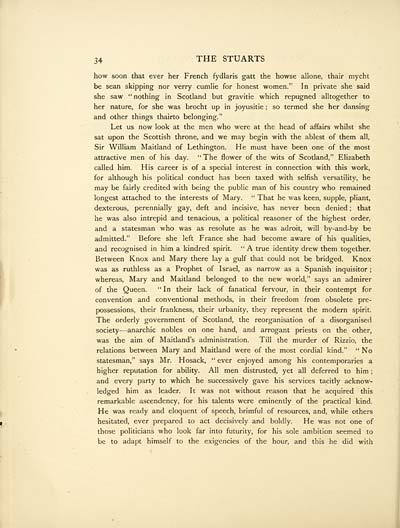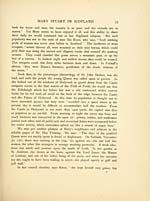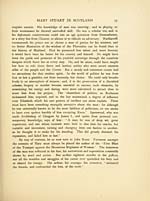Stuarts
(58) Page 34
Download files
Complete book:
Individual page:
Thumbnail gallery: Grid view | List view

34 THE STUARTS
how soon that ever her French fydlaris gatt the howse allone, thair mycht
be sean skipping nor verry cumlie for honest women." In private she said
she saw " nothing in Scotland but gravitie which repugned alltogether to
her nature, for she was brocht up in joyusitie ; so termed she her dansing
and other things thairto belonging."
Let us now look at the men who were at the head of affairs whilst she
sat upon the Scottish throne, and we may begin with the ablest of them all,
Sir William Maitland of Lethington. He must have been one of the most
attractive men of his day. "The flower of the wits of Scotland," Elizabeth
called him. His career is of a special interest in connection with this work,
for although his political conduct has been taxed with selfish versatility, he
may be fairly credited with being the public man of his country who remained
longest attached to the interests of Mary. " That he was keen, supple, pliant,
dexterous, perennially gay, deft and incisive, has never been denied ; that
he was also intrepid and tenacious, a political reasoner of the highest order,
and a statesman who was as resolute as he was adroit, will by-and-by be
admitted." Before she left France she had become aware of his qualities,
and recognised in him a kindred spirit. " A true identity drew them together.
Between Knox and Mary there lay a gulf that could not be bridged. Knox
was as ruthless as a Prophet of Israel, as narrow as a Spanish inquisitor ;
whereas, Mary and Maitland belonged to the new world," says an admirer
of the Queen. "In their lack of fanatical fervour, in their contempt for
convention and conventional methods, in their freedom from obsolete pre-
possessions, their frankness, their urbanity, they represent the modern spirit.
The orderly government of Scotland, the reorganisation of a disorganised
society — anarchic nobles on one hand, and arrogant priests on the other,
was the aim of Maitland's administration. Till the murder of Rizzio, the
relations between Mary and Maitland were of the most cordial kind." " No
statesman," says Mr. Hosack, " ever enjoyed among his contemporaries a
higher reputation for ability. All men distrusted, yet all deferred to him ;
and every party to which he successively gave his services tacitly acknow-
ledged him as leader. It was not without reason that he acquired this
remarkable ascendency, for his talents were eminently of the practical kind.
He was ready and eloquent of speech, brimful of resources, and, while others
hesitated, ever prepared to act decisively and boldly. He was not one of
those politicians who look far into futurity, for his sole ambition seemed to
be to adapt himself to the exigencies of the hour, and this he did with
how soon that ever her French fydlaris gatt the howse allone, thair mycht
be sean skipping nor verry cumlie for honest women." In private she said
she saw " nothing in Scotland but gravitie which repugned alltogether to
her nature, for she was brocht up in joyusitie ; so termed she her dansing
and other things thairto belonging."
Let us now look at the men who were at the head of affairs whilst she
sat upon the Scottish throne, and we may begin with the ablest of them all,
Sir William Maitland of Lethington. He must have been one of the most
attractive men of his day. "The flower of the wits of Scotland," Elizabeth
called him. His career is of a special interest in connection with this work,
for although his political conduct has been taxed with selfish versatility, he
may be fairly credited with being the public man of his country who remained
longest attached to the interests of Mary. " That he was keen, supple, pliant,
dexterous, perennially gay, deft and incisive, has never been denied ; that
he was also intrepid and tenacious, a political reasoner of the highest order,
and a statesman who was as resolute as he was adroit, will by-and-by be
admitted." Before she left France she had become aware of his qualities,
and recognised in him a kindred spirit. " A true identity drew them together.
Between Knox and Mary there lay a gulf that could not be bridged. Knox
was as ruthless as a Prophet of Israel, as narrow as a Spanish inquisitor ;
whereas, Mary and Maitland belonged to the new world," says an admirer
of the Queen. "In their lack of fanatical fervour, in their contempt for
convention and conventional methods, in their freedom from obsolete pre-
possessions, their frankness, their urbanity, they represent the modern spirit.
The orderly government of Scotland, the reorganisation of a disorganised
society — anarchic nobles on one hand, and arrogant priests on the other,
was the aim of Maitland's administration. Till the murder of Rizzio, the
relations between Mary and Maitland were of the most cordial kind." " No
statesman," says Mr. Hosack, " ever enjoyed among his contemporaries a
higher reputation for ability. All men distrusted, yet all deferred to him ;
and every party to which he successively gave his services tacitly acknow-
ledged him as leader. It was not without reason that he acquired this
remarkable ascendency, for his talents were eminently of the practical kind.
He was ready and eloquent of speech, brimful of resources, and, while others
hesitated, ever prepared to act decisively and boldly. He was not one of
those politicians who look far into futurity, for his sole ambition seemed to
be to adapt himself to the exigencies of the hour, and this he did with
Set display mode to:
![]() Universal Viewer |
Universal Viewer | ![]() Mirador |
Large image | Transcription
Mirador |
Large image | Transcription
Images and transcriptions on this page, including medium image downloads, may be used under the Creative Commons Attribution 4.0 International Licence unless otherwise stated. ![]()
| Histories of Scottish families > Stuarts > (58) Page 34 |
|---|
| Permanent URL | https://digital.nls.uk/95239747 |
|---|
| Description | A selection of almost 400 printed items relating to the history of Scottish families, mostly dating from the 19th and early 20th centuries. Includes memoirs, genealogies and clan histories, with a few produced by emigrant families. The earliest family history goes back to AD 916. |
|---|

